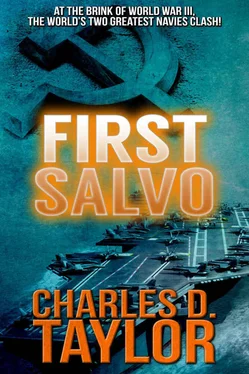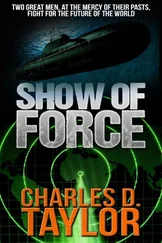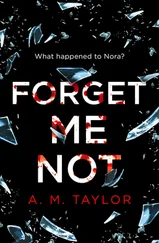It was Keradin’s infatuation with wines that had precipitated a crash course in the art of winemaking for Henry Cobb. Whisked by a military jet to an Air Force base north of San Francisco, Cobb was met by the man who would be his teacher over the next five days. Very little surprised Cobb. Yet his host, the scion of a successful, family-owned vineyard, consistently astonished him during those days. As he struggled to acquire the knowledge that had come to one man in a lifetime, Cobb also learned that hatred spans generations. His mentor proudly acknowledged working for the CIA whenever he was in Europe promoting his rapidly growing industry. Cobb would later reflect that he learned more than he bargained for about his quarry during his whirlwind education.
The dacha was remarkably similar to his host’s homestead in the Napa Valley. White plastered walls reflected the sun and allowed the inside to remain cool even on the hottest days. A veranda stretched much of the length of the building so that the inhabitants could come out to socialize in the sun or find enough privacy to be on their own. The only real difference was the many individual balconies on the second floor, much like a tacky motel, Cobb thought. These were where the staff slept, each with his own room, a nice gesture by Keradin to keep his people happy.
There was also a security force. It was composed of military intelligence people from the GRU, and they were very good. The CIA also reported that Keradin was an extremely private man who did not appreciate the trappings of the military when he escaped to the Crimea. Moscow was one world, his dacha the other. And in the latter he insisted that the GRU maintain a low profile. No man could relax in an armed camp, and Keradin felt that his vineyard, far from the mainstream, was not a place that would be easily targeted by an enemy. He felt secure.
Cobb circled to the north, above the highest vineyards. Within yards of his final goal, he found the rock outcroppings that had been so prominent in the photos. It was not above the fence that surrounded the vineyards, but it slanted upward enough, almost like the lip of a ski jump, to make it the weakest point on the perimeter.
His one weapon was a razor-sharp knife in his boot. With this, he was able to cut a sturdy sapling from a nearby stand of trees. Carefully, he sliced off the branches one by one, close to the trunk. Then just as prudently, he smeared the whitened scars on the bark with dirt. After he was over the fence, there would be no way to dispose of it, and he wanted nothing that would attract the attention of the guards.
Back on top of the outcropping, he tested the strength of the sapling, making sure it would take his weight. To the southeast, he could make out the faint glow over the Black Sea that presaged the sun and a new day. Planting the staff in the hard ground below, he bounced lightly on his toes for a second, then vaulted gracefully into the air. It was not really a pole vault. He wanted just enough height to clear the fence, just enough distance to land far enough beyond the sensing devices that he knew were implanted two yards beyond the fence. As he reached the apex of his leap, he very deliberately cast the sapling backward into some rye grass growing a few yards from the fence. With luck, the grass and the dirt he had rubbed into the cuts in the bark would hide it from curious eyes.
As he landed precisely on his toes, he rolled forward before his heels could make full impact on the turf. Touching the ground first with his right shoulder, he rolled twice in an effort to absorb the impact and avoid setting off an oversensitive device near the fence.
He was in! Remaining on his knees, his eyes searched in every direction, using the faint horizon as a backdrop to ensure there were no guards nearby. He’d been right. The flashlights he’d counted from outside represented the only men who were there. As the CIA report had stated, they felt secure enough on this hillside that there was no effort to make the vineyard impenetrable, no anticipation that someone like Cobb would seek entry in this manner. Very unlike the GRU , he thought, remembering the difficulty he once had breaking their security in Moscow.
Now creeping into the safety of a row of vines, all he could do was wait for the sun to rise, for the workers to arrive so that he could mix among them and move about as if he were one of the peasant laborers. He knew the basic location of every building and every path, and the purposes of most of them. However, there were some buildings to the west, in the lower part of the fields, that mystified him. He had to quickly develop a feel for the movement of the day, the habits of the workers, the daily customs and routines of the dacha that its inhabitants followed without thinking. Acclimatization was one of Cobb’s first steps wherever he went, and it was often what saved his neck in the first hours in a new place.
At a very early hour, when the sun had yet to heat the still air, the huge main gate was opened to allow the workers inside. Cobb noted both the security devices that were apparently turned off at this time and the location of the button that engaged an electric motor that moved the heavy gates. The guards had disposed of their rifles beforehand, their only weapons now apparently pistols. It was likely another of Keradin’s efforts to avoid the tension of an armed camp.
The peasants shuffled up the dirt path to a large building where a man, whom Cobb gathered must be the foreman, addressed them for a moment. As he did so, the first breezes of the day came up to him from the Black Sea. They carried a multiplicity of aromas that indicated to Cobb that many of the grapes had already been picked and crushed. The timing couldn’t have been more perfect, for this was the period that Keradin cherished most. They were about to harvest those special grapes, the most heavily sugared of all, that would eventually go into the finest wines. It could be a matter of days, though perhaps some were ready now, before they were ready for harvesting. Time was of the utmost importance to insure that the now-molding grapes contained just the right amount of sugar, that they had shriveled just enough to attain that magic essence the General treasured.
Keradin would be in the fields today, assessing the grapes himself, indicating those he wanted picked so that he might experiment. He usually wandered on his own, as shown in U.S. intelligence photographs. He would appear with a wide-brimmed hat shading him from the hot sun as he meandered through his vineyard, removing an occasional cluster of grapes from underneath the leaves to check their development, sometimes picking a grape to taste, other times slicing a cluster from the vine and dropping it into the picker’s basket slung from his shoulder. Remembering the soft peaceableness of his own mentor, and the similarity of habits between the two men seemed incongruous to Cobb.
To thoroughly know the entire compound and its daily habits, Cobb would have to make himself a part of its routine as quickly as possible. As the workers moved up the hillsides, each with a basket slung from one shoulder and balanced on the opposite hip, he moved out of a row and picked up a basket that had been carelessly dropped nearby. His dress was perfect, though he noted that many of the workers’ rough clothes were more stained by the harvest than his own. In a few moments, however, his own disguise was as blotched with juice as the others’.
The workers seemed to move with a numbing purpose, mechanically cutting, gently placing clusters of grapes in their baskets. They rarely talked, and this was fine with Cobb, though he longed to hear the local dialect to learn the oddities of local pronunciation.
As the sun climbed higher, the day quickly warmed, waves of heat rising from the now dry ground. Rivulets of perspiration ran from under his cap, streaking his dusty features before they coursed down his back and chest. Pratt had once referred to him as a chameleon, and now Cobb adapted so rapidly to those around him that few would have recognized the movement of his head and eyes as he studied and memorized everything around him. Yet, with a natural expertise, he selected the proper bunches, separating them neatly from the vine with a quick slash of his knife and placing them gently in the basket to avoid damage to the fruit.
Читать дальше












